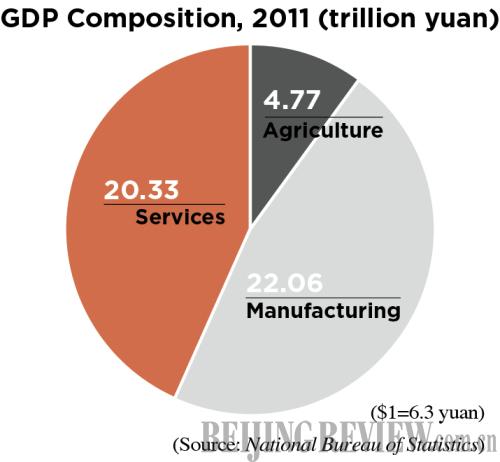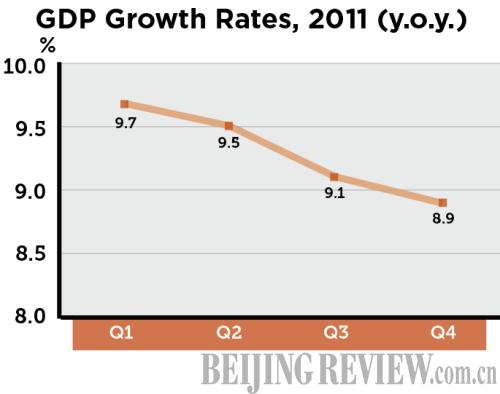|
The greatest risk for China this year is external, as the European debt crisis is likely to deteriorate, causing further pains for Chinese exporters, said Peng Wensheng, chief economist at the China International Capital Corp.
Wang Tao, chief China economist with the Swiss investment bank UBS, also struck a note of caution. Wang expected China's export growth to drop to zero in 2012, which would trim 1.4 percentage points off GDP growth, although she does not think the trade surplus will completely vanish in 2012.
"But looking from a global perspective, the shrinking trade surplus should be seen as a welcome development, an evidence that China has made progress in redressing trade imbalance," she added.
"The export situation will be grim in 2012, especially in the first half of the year," said Zhang Xiaoqiang, Vice Chairman of the National Development and Reform Commission, at a recent forum held in Beijing.
Zhang expected China's foreign trade to grow 10 percent in 2012, much slower than the 22.5 percent in 2011.
Shen Jianguang, Greater China chief economist at Mizuho Securities Asia Ltd., believed another cause for concern lies in the rapidly cooling property markets.
"Stagnating property investments have sent a chill throughout relevant industries such as appliances and cement," he said. "Meanwhile, lagging land sales are making a dent to fiscal capacities of local governments."
"Other risks looming over the economy include growing debts of local governments and rampant private lending," said Zhu Baoliang, a researcher at the State Information Center.
"Properly dealing with those problems will be key to economic stability this year," he said.
To soothe abounding growth worries, policymakers have cautiously handed out incentives on a selective basis, including favorable policies for smaller businesses in terms of credit support, taxation and government purchases.
On November 30, 2011, the central bank announced plans to decrease the ratio of deposits that banks must set aside in reserve by 0.5 percentage points for the first time in three years.
"Waning inflation has allowed the country to stop tightening monetary policy, but the speed and format of further loosening will largely depend on how domestic and overseas situations develop," said Guo Tianyong, Director of the Research Center of China's Banking Industry, Central University of Finance and Economics.
"Despite falling CPI, long-term inflation pressures remain, forcing policymakers to keep a vigilant eye on consumer prices," said Fan.
Fan noted that domestic inflation will be an inevitable trend, as resource prices, labor costs, and land prices head north. "China's broad money supply is almost two times that of the GDP, the highest ratio among major global economies. The excess liquidity may easily reignite inflation once regulatory controls become loose," he said.
"The United States is also likely to start a third round of quantitative easing, paving way for China's inflation to come back," he added.
Fan suggested China strengthen supplies of agricultural products by improving farming technologies, logistics efficiency and rural finance.
"On the liquidity front, there is limited room for policymakers to aggressively ease the monetary policies," he said.
Wang Jian, Secretary General of China Society of Macroeconomics, said it is too early to lower the guard against inflation as the Lunar New Year spending may trigger a rebound in food prices.
"The persistent conflict between expanding population and shrinking arable land will push up grain prices," he said. "International commodities prices are also likely to bounce back due to recovering demand in emerging economies."
"Those factors may drive CPI back to no less than 5 percent this year, and possibly above 6 percent in the fourth quarter," he added.
 
Email us at: huyue@bjreview.com | 